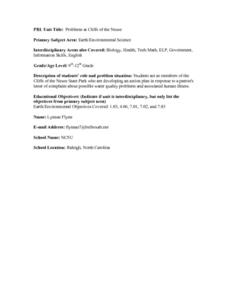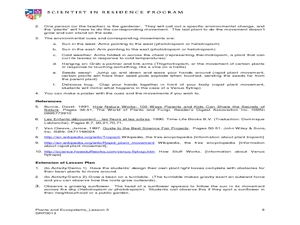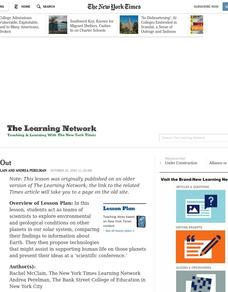Curated OER
The Impact
Learn about the destruction of the rainforest by analyzing statistics. Young learners make an original line graph showing destruction in the rainforest. Additional activities include making a collage, sequencing Dr. Seuss' The...
Curated OER
Nonprofit Environmental Groups
Students examine the importance of nonprofit organizations when it comes to the environment. They discover how to evaluate different organizations. They research different organizations and present their findings to the class.
Curated OER
The Write Thing to Do
Students examine the proper way to write formal business letters. Students apply the skill to write letters to appropriate environmental protection agencies.
Curated OER
MOBILITY, Traveling Lightly: What’s My Footprint?
Students calculate their carbon footprint. In this environmental technology lesson, students listen to a lecture on climate change. Students brainstorm solutions to reduce environmental impact based on travel options. Students calculate...
Curated OER
Tell Someone About Earth Day
Young scholars discuss ways in which grown ups can save energy, money and the Earth in preparation for sending out Earth Day e-cards. They make an Earth Day action list.
Curated OER
What is a Global Citizen?
Young scholars discover how to become a good citizen and to make a positive difference in our world. In this social studies lesson plan, learners put a list of 9 social and environmental responsibilities in order of importance. Groups...
Curated OER
And Your Point Is . . .? Part I
Students, in groups, complete a WebQuest titled "Love Canal Debate". They follow the WebQuest to research and write papers on different points of view regarding the Love Canal environmental disaster.
Curated OER
Global Warming
Students are members of the North Carolina Environmental Management Commission. They make recommendations to the "governor" and a panel of his advisors regarding the greenhouse effect and global warming.
Curated OER
Hazardous Chemicals in Your Neighborhood
Students examine the effect of hazardous chemicals on humans. They discover how the chemicals are cleaned up and the facilities in their neighborhood. They identify federal and local agencies that oversee environmental hazards
Curated OER
Problems at Cliffs of the Neuse
Students assume the roles of members of the Cliffs of the Neuse Sate Park and must develop an action plan in response to a complaint about possible water quality problems and associated human illnesses. Students conduct research on the...
Curated OER
Making Recycled Paper
Students explore the advantages of recycling paper. In this environmental lesson plan, students produce recycled paper by ripping up paper and putting it into a blender with water to create a mixture. Students use their recycled paper to...
Curated OER
Earth Day Activities
Earth Day is April 22nd - you can celebrate by incorporating some environmental activities into your curriculum Code: F7G4U8JHCDTD.
Curated OER
Microfinancing Works for Local Citizens and Foreign Business
Students define social responsibility. They describe examples of social responsibilities businesses have to society. Analyze special challenges in operations. Identify entrepreneurial opportunities available in international business.
Curated OER
Land Use and Lawmaking in California
Students design a plan for a housing development in their city. In this house development lesson plan, students observe pictures of land use, research lawmaking, and develop a plan for an environmentally friendly housing development in...
Curated OER
Pond Water Web
Students familiarize themselves with the common organisms that live in a pond and discover their importance in a balanced aquatic habitat as they create food webs. They also investigate how an environmental change affects the habitat as...
Curated OER
The World in Our Food
Students explore the history of ingredients in one of the recipes they prepare in class. They examine where each ingredient is produced and under what conditions. In addition, they brainstorm alternatives that are environmentally...
Curated OER
Emergency Preparedness
Students are introduced to governmental and humanitarian responses to disasters. They research organizations such as FEMA and the Red Cross. They examine their local National Guard unit as well.
Curated OER
Plants Alive! How Plants Grow and Move
Students explore how plants move in response to the environment. In this plant lesson, students engage in three different experiments to investigate how plants grow and move. Resources available in English and French.
Curated OER
Spacing Out
Young scholars explore environmental and geological conditions on other planets in our solar system, comparing their findings to information about Earth. They propose technologies that might assist in supporting human life on those planets.
Curated OER
Creating an Enzyme-Substrate Model
High schoolers explore the reaction rates of an enzyme-mediated reaction through experimentation. In small groups, they use everyday objects to demonstrate the effects of environmental variables on enzyme function.
Students graph and...
Curated OER
Recycling
Third graders observe the importance of recycling. In this environmental lesson plan, 3rd graders will view experiments on water filtration, paper-making, and breathing pollutants, and will categorize recyclable materials.
Curated OER
The Environment and You
First graders examine the human environmental impact and discover ways to lessen effects. They create a pollution damage flow chart and write down what they think Mother Earth might say. They create inventions from recyclable materials.
Curated OER
100% Recyclable
Seventh graders research recycling activities at schools across the country using e-mail. They research the waste management and recycling program at their school and problem solve to create an environmentally sound program for the future.
Curated OER
How Do You Measure Up
Students investigate the concept of heart rate and how it is effected by environmental stresses like exercise. They conduct research readings and evaluate the data to form a hypothesis to initiate class discussion about the information.























